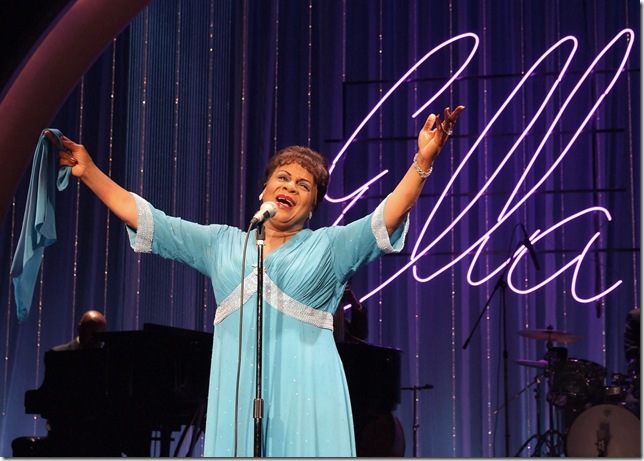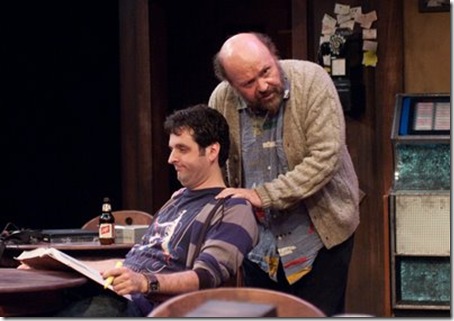You’ll always remember where you were and what you were doing when you heard about JFK’s assassination. The attack on the Twin Towers on 9/11. Or Florida Stage declaring bankruptcy, closing its doors and ceasing operations forever.
OK, that third one is not as momentous as the other two, but it came as almost as big a surprise. At least I was caught flat-footed by the news, delivered by e-mail Monday afternoon, that the 24-year-old Palm Beach County cultural fixture had abruptly ended its run with the final performance of Carter W. Lewis’s The Cha-Cha of the Camel Spider the day before.
After all, just a week earlier I had interviewed by phone Tina Fabrique and Rob Ruggiero, the star and director of the biographical revue Ella, which was scheduled to begin performances as Florida Stage’s summer show this coming Thursday. So how could Florida Stage suddenly be no more?
I knew there was subscriber dissatisfaction about the company’s move to the Kravis Center, but not that subscription levels had shrunk from a high of 7,000 to fewer than 2,000 for the 2011-2012 season that will not happen now.
It was a little over a year ago that producing director Louis Tyrrell and managing director Nan Barnett expressed such optimism for the company’s future as it moved from an unassuming strip mall in Manalapan to the Kravis in West Palm Beach, thereby saving $200,000 in annual rent. Sure, there was the cost of the move and the cost of new seating — which wasn’t really all that comfortable — but surely Tyrrell and Barnett were too smart to make such a major decision without doing their marketing homework about the move’s acceptance with its audience.
Besides, this was Florida Stage, “the nation’s largest professional theater dedicated to producing exclusively new and emerging American plays.” The theater which grew from its first humble home, a tiny playhouse on the campus of Palm Beach Stage College, to earning a national reputation for championing such playwrights as Nilo Cruz, Deborah Zoe Laufer, Carter W. Lewis and Jeffrey Hatcher, to name just a few. And featuring on its stage world or regional premieres by such major American writers as Israel Horovitz, William Mastrosimone, Steven Dietz, Athol Fugard and Lee Blessing.
It is not just that Florida Stage will no longer be rendering these works with its signature care and clarity, but is hard to imagine the remaining theater companies in the immediate area picking up the slack by producing many of these contemporary voices.
Florida Stage was such a model for regional theaters who devote themselves to adventuresome new work that the theater critics for the daily newspapers in South Florida often nominated Florida Stage for a Tony Award. And there were reasons to believe that we were inching closer to gaining that recognition for the company.
I will concede that I have a bias towards new plays, towards being challenged and surprised each time I went to Florida Stage. And for many years, the company had amassed a loyal following of like-minded theatergoers. To stay for a post-show talkback and to hear the fervor with which they dissected the ideas and dramaturgy they had just experienced, it is hard to imagine that its subscribers had dwindled so far so quickly.
I have been attending and reviewing Florida Stage since I arrived in Palm Beach County 17-and-a-half years ago. Scrolling through the group’s production history on its website, it is easy to recall some of the vivid viewing experiences I have had with the company.
Like Tammy Ryan’s The Music Lesson, the tale of a war-ravaged Bosnian émigré piano teacher, in a pitch-perfect production that almost made it to off-Broadway. Three varied plays by Thomas Gibbons (Bee-Luther-Hatchee, Collected Stories, A House With No Walls) which posed such interesting questions about race in America today.
Michael Hollinger’s Red Herring, which found a way to generate comedy from the dark days of McCarthyism without trivializing them. God’s Man in Texas, by David Rambo, a look at the big business of mega-churches and matters of faith. Athol Fugard’s Exits and Entrances, a valentine to the alchemy that is theater from the towering dramatist of South Africa. And Steven Dietz’s Yankee Tavern, an eerie yarn that spins on 9-11 conspiracy theories.
Of course there are many more, since Florida Stage produced some 150 plays in its 24 years. And if this past February’s 1st Stage new works festival was a reliable indication, the 25th anniversary season — the season that will not be happening — would have added a few productions to the most memorable list.
Once the shock of Monday’s announcement wears off, there will be the sifting through the details of Florida Stage’s demise for lessons to learn, just as there was for the Burt Reynolds Institute for Theatre Training, The Jupiter Theatre, Royal Palm Dinner Theatre, Royal Poinciana Playhouse, all of which went dark during the past two decades.
On Florida Stage’s website, there are a number of Frequently Asked Questions which the theater posed to itself as a way to get information out to its patrons. Perhaps the most salient is “With the closing of Florida Stage, why should I support other arts organizations?”
The proffered answer addresses the importance of art and the value of culture, which are probably givens to anyone surfing the site. The implied but unspoken reason, of course, is to prevent further diminishment of the arts scene here, an unthinkable but very real possibility.


